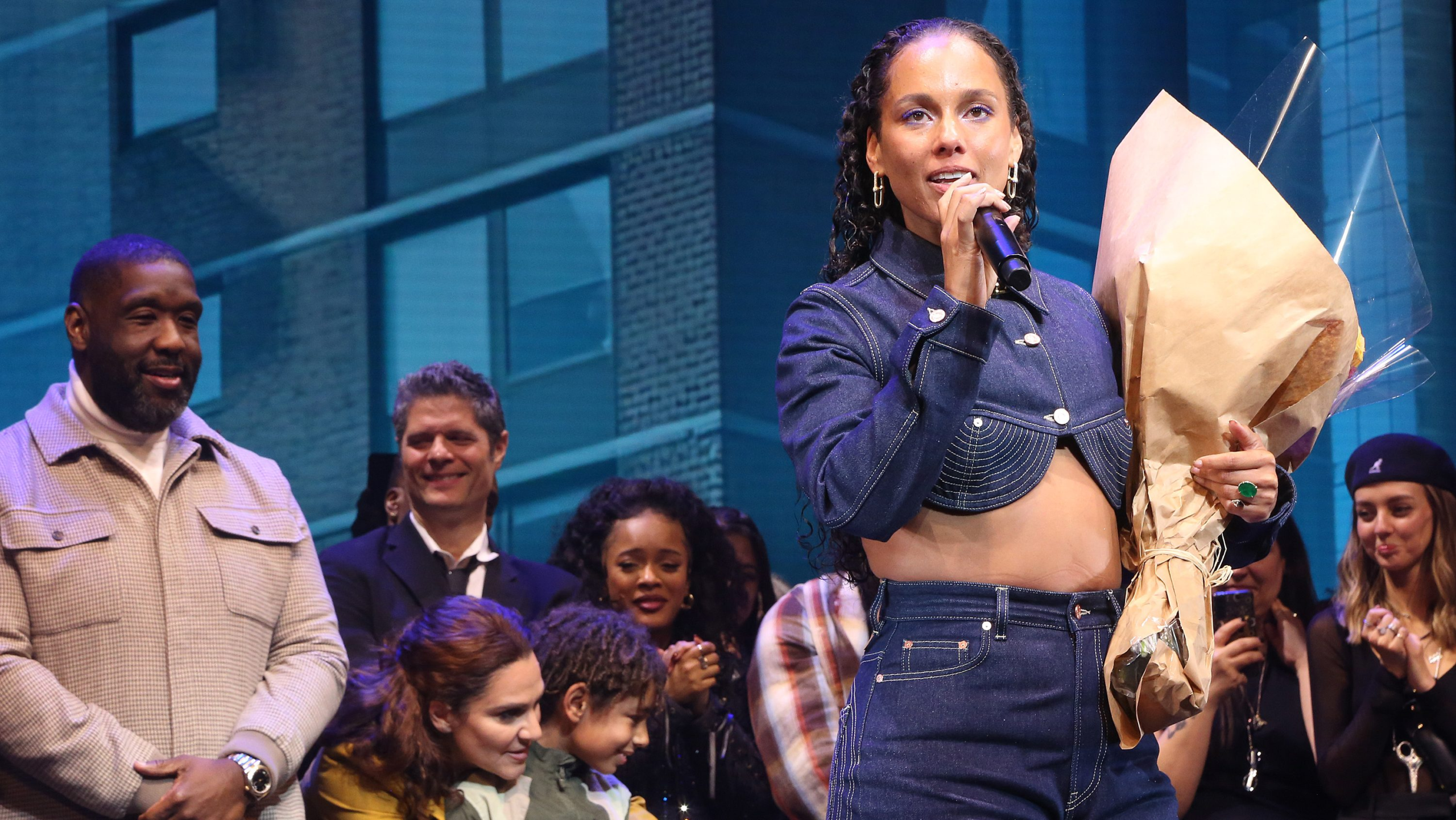We bring news that matters to your inbox, to help you stay informed and entertained.
Terms of Use and Privacy Policy Agreement
WELCOME TO THE FAMILY! Please check your email for confirmation from us.
Culture Watch
Amid 13 Tony nominations for Alicia Keys’ Broadway musical “Hell’s Kitchen,” cultural critic Miles Marshall Lewis speaks with nominated choreographer Camille A. Brown.
Arguably, no R&B singer-songwriter not named Beyoncé is having as banner a year as Alicia Keys. At February’s Grammy Awards, Keys walked away with a golden gramophone when a 20th-anniversary reissue of her 2003 sophomore album, “The Diary of Alicia Keys,” won Best Immersive Audio Album. Days later, the Brooklyn Museum opened “Giants: Art from the Dean Collection of Swizz Beatz and Alicia Keys,” giving the public access to a personal collection including work from Jean-Michel Basquiat, Gordon Parks and others. And last month, “Hell’s Kitchen” opened on Broadway: a coming-of-age love story inspired by Keys’ upbringing on the west side of midtown Manhattan during the 1990s.
An autobiographical jukebox musical with 13 Tony Award nominations (including Best Musical and Best Choreography), “Hell’s Kitchen” draws on over 20 Alicia Keys originals — e.g., “Fallin’,” “Girl on Fire,” “Un-Thinkable (I’m Ready)” and more — to enhance a storyline about teenage Ali (played by Meleah Joi Moon) dealing with an overprotective mom (Tony-nominated Shoshana Bean) and the magnetic Knuck (Chris Lee), an aspiring drummer she’s fallen for. As a period piece full of Tommy Hilfiger, FUBU, Phat Farm and a conspicuous absence of smartphones, the play also comes complete with plenty of ’90s-style choreography, courtesy of “Hell’s Kitchen” choreographer Camille A. Brown.
“Hell’s Kitchen” fully lays down its narrative latticework in the first 15 minutes, written by Pulitzer finalist Kristoffer Diaz. Ali and her mom, Jersey, exhibit the push and pull inherent in many stories of single-parent households: smothering mothers or fathers vs. rebellious children. Knuck is introduced street-drumming on overturned plastic buckets with his crew, initially dismissive of Ali’s romantic overtures, given their age difference. (Holding down a public painting job and his own apartment, Knuck appears to be in his mid-20s to Ali’s 17.) Ali quickly cuts Jersey’s maternal apron strings by starting a semi-scandalous affair with a grown man while simultaneously embarking on piano lessons under the tutelage of an older pianist in her building, Miss Liza Jane (played by Kecia Lewis).
Ali’s first encounter with her classically trained mentor is set to Lewis’s captivating performance of “Kaleidoscope,” one of the few songs (including “The River” and “Seventeen”) originally composed by Alicia Keys for “Hell’s Kitchen.” The choreography of the scene shifts poignantly from the “In Living Color”/TLC-inspired ’90s movements of the rest of the play. As choreographer Brown explained to theGrio, “This is the first time Ali sees a reflection of herself or her possibilities. What sparks doesn’t necessarily have to be [expressed as dance from] the ’90s. That can just be solely on emotion. I was really homing in on my modern dance language. My movement taps into step, social dance, hip-hop, ballet, jazz and modern. That was an opportunity to show my movement language through modern dance.”
Originally staged at the Public Theater last November, the Broadway production features an improved, tighter second act and better storyline pacing, making for a more cohesive play in alignment with the likes of the Tony-winning “MJ the Musical” and the bygone Tony nominee “Motown: The Musical.” Taking place during a golden age of hip-hop, it’s unfortunate that rap isn’t represented in “Hell’s Kitchen,” even with “Empire State of Mind,” originally featuring Jay-Z, included in the production.) Given the need to accommodate 24 Alicia Keys songs, the inclusion of any other music was a near impossibility. But even with the absence of Jigga, Biggie Smalls and the era’s other rap titans, the decade’s spirit comes through strong enough through the costuming and, importantly, the dance.
“We were all clear about it being from the ’90s,” said Brown. “But Alicia and the creative team really gave me the agency to reflect what the ’90s and the spirit of the ’90s through movement means to me.”
To paraphrase house music legend Marshall Jefferson’s late ’80s classic, move your body down to the Shubert Theater with a quickness — “Hell’s Kitchen” tickets are currently on sale through January 2025.
Associated Press
TheGrio Entertainment
Miles Marshall Lewis
Associated Press
Kay Wicker
ShaCamree Gowdy
U.S. Congressman James E. Clyburn (SC-06)
Deon Osborne
STREAM FREE
MOVIES, LIFESTYLE
AND NEWS CONTENT
ON OUR NEW APP

